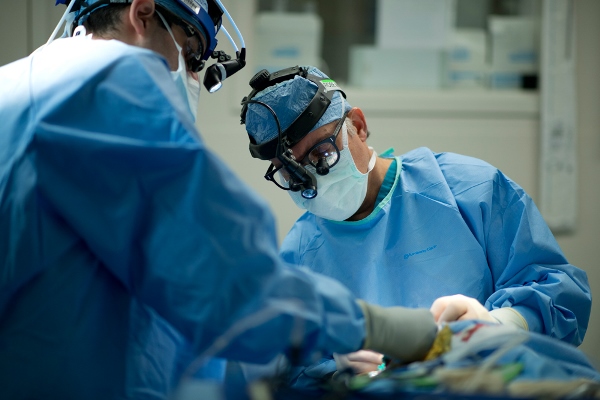Head and neck reconstructive surgery
Head and neck reconstructive surgery is a specialized field within surgical oncology and plastic surgery that focuses on restoring the form and function of the head and neck region after surgery, trauma, or congenital anomalies. This type of surgery is often performed following the removal of tumors, particularly in the treatment of head and neck cancers. Dr. Sowrabh is the best doctor for head & neck tumor in Meerut, it's crucial to seek a specialist with expertise in both surgical oncology and reconstructive surgery.

Here are key aspects of head and neck reconstructive surgery:
1. Goals of Reconstructive Surgery:
- Functional Restoration: The primary goal is to restore function, including speech, swallowing, and facial expressions.
- Cosmetic Restoration: Reconstructive surgery aims to achieve aesthetic results and improve the patient's appearance after the removal of tumors or other tissue defects.
2. Common Indications:
- Head and Neck Cancer: Reconstructive surgery is often performed after the removal of tumors in the head and neck region, including the jaw, tongue, throat, and face.
- Trauma: Reconstructive procedures may be necessary to repair damage caused by traumatic injuries, such as fractures or soft tissue injuries.
- Congenital Anomalies: Some individuals may require reconstructive surgery to address congenital conditions affecting the head and neck.
3. Types of Reconstructive Procedures:
- Free Flap Reconstruction: This involves taking tissue, along with its blood supply, from one part of the body (donor site) and transferring it to the head and neck region. This is commonly used for larger defects.
- Local Flap Reconstruction: Tissue from a nearby area is repositioned to cover a defect or reconstruct a specific region.
- Microvascular Surgery: Involves reattaching small blood vessels to ensure proper blood supply to the reconstructed area.
- Bone Grafting: Used to reconstruct bony defects in the jaw or other facial bones.
- Facial Nerve Reconstruction: In cases where facial nerves are affected, surgical techniques may be employed to restore facial movement.
4. Multidisciplinary Approach:
- Head and neck reconstructive surgery often involves a multidisciplinary team of surgeons, including head and neck surgeons, plastic surgeons, oral and maxillofacial surgeons, and otolaryngologists, among others.
5. Postoperative Care:
- Head and neck reconstructive surgery often involves a multidisciplinary team of surgeons, including head and neck surgeons, plastic surgeons, oral and maxillofacial surgeons, and otolaryngologists, among others.
5. Postoperative Care:
- Head and neck reconstructive surgery often involves a multidisciplinary team of surgeons, including head and neck surgeons, plastic surgeons, oral and maxillofacial surgeons, and otolaryngologists, among others.
- Long-term follow-up is important to monitor the healing process and address any complications.
- Free Flap Reconstruction: This involves taking tissue, along with its blood supply, from one part of the body (donor site) and transferring it to the head and neck region. This is commonly used for larger defects.
- Local Flap Reconstruction: Tissue from a nearby area is repositioned to cover a defect or reconstruct a specific region.
- Microvascular Surgery: Involves reattaching small blood vessels to ensure proper blood supply to the reconstructed area.
- Bone Grafting: Used to reconstruct bony defects in the jaw or other facial bones.
- Facial Nerve Reconstruction: In cases where facial nerves are affected, surgical techniques may be employed to restore facial movement.
4. Multidisciplinary Approach:
- Head and neck reconstructive surgery often involves a multidisciplinary team of surgeons, including head and neck surgeons, plastic surgeons, oral and maxillofacial surgeons, and otolaryngologists, among others.
5. Postoperative Care:
- Head and neck reconstructive surgery often involves a multidisciplinary team of surgeons, including head and neck surgeons, plastic surgeons, oral and maxillofacial surgeons, and otolaryngologists, among others.
5. Postoperative Care:
- Head and neck reconstructive surgery often involves a multidisciplinary team of surgeons, including head and neck surgeons, plastic surgeons, oral and maxillofacial surgeons, and otolaryngologists, among others.
- Long-term follow-up is important to monitor the healing process and address any complications.
- Head and neck reconstructive surgery often involves a multidisciplinary team of surgeons, including head and neck surgeons, plastic surgeons, oral and maxillofacial surgeons, and otolaryngologists, among others.
5. Postoperative Care:
- Head and neck reconstructive surgery often involves a multidisciplinary team of surgeons, including head and neck surgeons, plastic surgeons, oral and maxillofacial surgeons, and otolaryngologists, among others.
5. Postoperative Care:
- Head and neck reconstructive surgery often involves a multidisciplinary team of surgeons, including head and neck surgeons, plastic surgeons, oral and maxillofacial surgeons, and otolaryngologists, among others.
- Long-term follow-up is important to monitor the healing process and address any complications.
- Head and neck reconstructive surgery often involves a multidisciplinary team of surgeons, including head and neck surgeons, plastic surgeons, oral and maxillofacial surgeons, and otolaryngologists, among others.
5. Postoperative Care:
- Head and neck reconstructive surgery often involves a multidisciplinary team of surgeons, including head and neck surgeons, plastic surgeons, oral and maxillofacial surgeons, and otolaryngologists, among others.
- Long-term follow-up is important to monitor the healing process and address any complications.
- Head and neck reconstructive surgery often involves a multidisciplinary team of surgeons, including head and neck surgeons, plastic surgeons, oral and maxillofacial surgeons, and otolaryngologists, among others.
- Long-term follow-up is important to monitor the healing process and address any complications.
Reconstructive surgery in the head and neck area, particularly for addressing tumors, is a complex and highly specialized field. The choice of reconstructive technique depends on factors such as the size and location of the defect, the patient's overall health, and the specific goals of reconstruction. A comprehensive evaluation by a skilled and experienced surgical team, Dr. Sowrabh Arora is one of the best doctor for head & neck tumor in Greater Noida, is essential to determine the most appropriate approach for each individual case.


 Max Hospital, Vaishali, Gaziabad
Max Hospital, Vaishali, Gaziabad